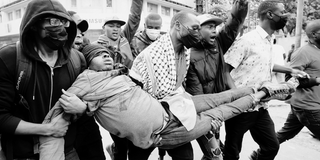Boniface Kariuki: Nairobi hawker who was shot in the head by police is dead

Face mask vendor Boniface Kariuki is rushed to hospital by protesters after he was shot by a police officer in Nairobi on June 17, 2025.
Hours after he was declared brain-dead, mask vendor Boniface Kariuki who was shot when protests turned chaotic in Nairobi on June 17, 2025, finally breathed his last at 3.15 pm on Monday.
He was 22.
But long before his death, his family had feared the worst and had resigned themselves to a fate they could neither fight nor change.
“He is no longer with us,” said the family spokesperson, Emily Wanjira.
Since Kariuki was first admitted at Kenyatta National Hospital, his uncle Mwangi wa Hillary said the family had not observed any signs of improvement.
He said Kariuki had remained unresponsive from day one until the moment he passed away. He is survived by three siblings and his parents.
The final moments of Kariuki’s life were captured in the heart-breaking amateur video where two police officers were seen roughing him up before one of them pulled the trigger that brought him down in the Nairobi Central Business District.
Since that day, his father Jonna Kariuki, also a hawker in the city, has barely left Kenyatta National Hospital. He visited his son during the prescribed hours, silently standing by his bedside, clinging to the hope that his firstborn might open his eyes again. He has not reported to work or slept properly since that day, he said.
“Now we face a difficult task because releasing the body requires money, and we do not have it. I would like to see justice take its course because my child had done nothing wrong,” he said.
“This has hurt us a lot,” he added. “He was my only hope.”
As of the time of his death, the hospital bill had accrued to over Sh3.6 million, according to family spokesperson Emily Wanjira.
“We are very saddened that such a young man like Kariuki would be killed while simply selling masks,” the uncle said.
His body currently lies at the Kenyatta National Hospital mortuary and the family is appealing for financial assistance.
Following multiple incidents of police excesses, the police have come under intense scrutiny. Days after the official police narrative claimed that Albert Ojwang’—a teacher and blogger—died by suicide while in police custody, public outrage forced senior police officers to make an unexpected visit to his family home in Homa Bay County.
On June 19, a delegation led by Nyanza Regional Police Commander Gisiri Nyamohanga visited the Ojwang’ family in Kakoth Village, Kokwanyo Location. Besides offering condolences, the officers brought rice, sugar, milk and vegetables.
Police are widely believed to be complicit in Ojwang’s death, a sentiment that has only fuelled public anger. Homa Bay County Police Commander Lawrence Koilem who was part of the visiting team said the gesture was meant to show solidarity with the grieving family.
Similar scenes played out days later in Nduni Village, Murang’a County, where Central Region Police Commander Samuel Ndanyi visited the family of Kariuki.
Food supplies
On June 23, Mr Ndanyi accompanied by officers from various departments—conveyed condolences from the Inspector General of Police, Douglas Kanja. The officers also brought food supplies and expressed personal regret attributing the incident to misconduct by an individual officer.
Interior Cabinet Secretary Kipchumba Murkomen also addressed the issue on June 24 during an event at State House, Nairobi, where he hosted Kenya Police FC—the FKF Premier League champions.
“In the ministry, we are ready to meet the families of those who unfortunately suffered as a result [of police brutality or] lost their children… It does not matter what happened. From a human perspective, we are ready to meet their families, have a conversation with them and see what else we can do to support them,” Mr Murkomen said.
But the rare visits have sparked debate.
“These police officers want to demonstrate that the act of excessive use of force was—or is—regrettable. Secondly, to add a human touch to that kind of empathetic feeling,” said governance expert Javas Bigambo. He noted, however, that such actions are not grounded in law.
To others, the visits carry a troubling undertone.
Kenya Human Rights Commission Communications Officer Ernest Cornel believes the message being sent is that life can be reduced to a transaction.
“The message it sends is that your life is worth the amount I'm coming to give you. That your life is not so important. After all, I can kill you and then come and speak to your family… That's the message they are sending. Nothing else. That your life is so, so cheap that it can be bought,” said Mr Cornel.
Police spokesperson Muchiri Nyaga told the Nation by phone: “We’ve gotten to a point where this is about the country... We have to de-escalate the situation we have been having. These visits are not just visits of empathy,” Mr Muchiri said, explaining that the police have adopted a collaborative approach. “We are going to have more of these."


